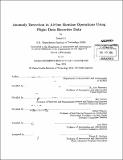| dc.contributor.advisor | R. John Hansman. | en_US |
| dc.contributor.author | Li, Lishuai | en_US |
| dc.contributor.other | Massachusetts Institute of Technology. Department of Aeronautics and Astronautics. | en_US |
| dc.date.accessioned | 2013-11-18T21:45:43Z | |
| dc.date.available | 2013-11-18T21:45:43Z | |
| dc.date.copyright | 2013 | en_US |
| dc.date.issued | 2013 | en_US |
| dc.identifier.uri | http://hdl.handle.net/1721.1/82498 | |
| dc.description | Thesis (Ph. D.)--Massachusetts Institute of Technology, Dept. of Aeronautics and Astronautics, 2013. | en_US |
| dc.description | This thesis was scanned as part of an electronic thesis pilot project. | en_US |
| dc.description | Cataloged from PDF version of thesis. | en_US |
| dc.description | Includes bibliographical references (p. 141-145). | en_US |
| dc.description.abstract | In order to improve safety in current air carrier operations, there is a growing emphasis on proactive safety management systems. These systems identify and mitigate risks before accidents occur. This thesis develops a new anomaly detection approach using routine operational data to support proactive safety management. The research applies cluster analysis to detect abnormal flights based on Flight Data Recorder (FDR) data. Results from cluster analysis are provided to domain experts to verify operational significance of such anomalies and associated safety hazards. Compared with existing methods, the cluster-based approach is capable of identifying new types of anomalies that were previously unaccounted for. It can help airlines detect early signs of performance deviation, identify safety degradation, deploy predictive maintenance, and train staff accordingly. The first part of the detection approach employs data-mining algorithms to identify flights of interest from FDR data. These data are transformed into a high-dimensional space for cluster analysis, where normal patterns are identified in clusters while anomalies are detected as outliers. Two cluster-based anomaly detection algorithms were developed to explore different transformation techniques: ClusterAD-Flight and ClusterAD-Data Sample. The second part of the detection approach is domain expert review. The review process is to determine whether detected anomalies are operationally significant and whether they represent safety risks. Several data visualization tools were developed to support the review process which can be otherwise labor-intensive: the Flight Parameter Plots can present raw FDR data in informative graphics; The Flight Abnormality Visualization can help domain experts quickly locate the source of such anomalies. A number of evaluation studies were conducted using airline FDR data. ClusterAD-Flight and ClusterAD-Data Sample were compared with Exceedance Detection, the current method in use by airlines, and MKAD, another anomaly detection algorithm developed at NASA, using a dataset of 25519 A320 flights. An evaluation of the entire detection approach was conducted with domain experts using a dataset of 10,528 A320 flights. Results showed that both cluster-based detection algorithms were able to identify operationally significant anomalies that beyond the capacities of current methods. Also, domain experts confirmed that the data visualization tools were effective in supporting the review process. | en_US |
| dc.description.statementofresponsibility | by Lishuai Li. | en_US |
| dc.format.extent | 145 p. | en_US |
| dc.language.iso | eng | en_US |
| dc.publisher | Massachusetts Institute of Technology | en_US |
| dc.rights | M.I.T. theses are protected by
copyright. They may be viewed from this source for any purpose, but
reproduction or distribution in any format is prohibited without written
permission. See provided URL for inquiries about permission. | en_US |
| dc.rights.uri | http://dspace.mit.edu/handle/1721.1/7582 | en_US |
| dc.subject | Aeronautics and Astronautics. | en_US |
| dc.title | Anomaly detection in airline routine operations using flight data recorder data | en_US |
| dc.type | Thesis | en_US |
| dc.description.degree | Ph.D. | en_US |
| dc.contributor.department | Massachusetts Institute of Technology. Department of Aeronautics and Astronautics | |
| dc.identifier.oclc | 862430295 | en_US |
